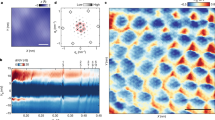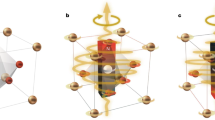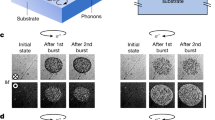Abstract
WE had the privilege of hearing of his results from Dr. Penrose shortly after his discovery of the hyperfine structure of paramagnetic resonance, and of discussing them with him when he was on a visit to Oxford. We were stimulated to make some calculations on the effect, in particular its variation with orientation of the applied field, and kept up a correspondence with him on this subject, which was interrupted by his death. The variation observed by Penrose differs markedly from the expected variation calculated by us on the basis of Polder's theory, and we believe that the discrepancy indicates an influence of the crystalline electric field on paramagnetic ions more complicated than has been generally assumed. Penrose's work, therefore, opens a new and fruitful approach to the study of paramagnetism.
This is a preview of subscription content, access via your institution
Access options
Subscribe to this journal
Receive 51 print issues and online access
$199.00 per year
only $3.90 per issue
Buy this article
- Purchase on Springer Link
- Instant access to full article PDF
Prices may be subject to local taxes which are calculated during checkout
Similar content being viewed by others
Author information
Authors and Affiliations
Rights and permissions
About this article
Cite this article
ABRAGAM, A., PRYCE, M. [Letters to the Editor]. Nature 163, 992–993 (1949). https://doi.org/10.1038/163992c0
Issue Date:
DOI: https://doi.org/10.1038/163992c0
This article is cited by
-
Magnetic resonance in Kazan and in Oxford
Applied Magnetic Resonance (1992)
-
Hyperfine interactions-un peu d'histoire
Hyperfine Interactions (1991)
-
La spectroscopie des ondes hertziennes
Experientia (1953)
Comments
By submitting a comment you agree to abide by our Terms and Community Guidelines. If you find something abusive or that does not comply with our terms or guidelines please flag it as inappropriate.



